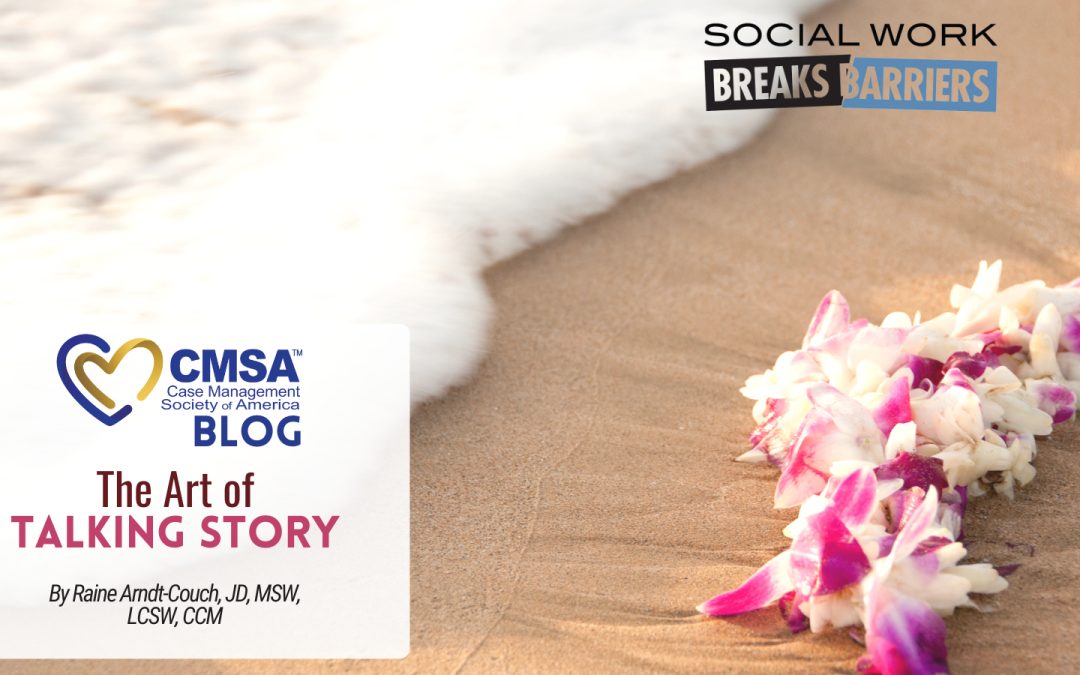By Raine Arndt-Couch, JD, MSW, LCSW, CCM
Growing up in Hawai’i, I learned at a very early age the importance of “talking story.” Known in other communities as chit-chat or small talk, the practice itself can appear purely casual: a way to simply pass the time.
For example, one of the most common questions upon meeting someone new in Hawai’i is: Where’d you go to school? Intended to identify one’s high school alma mater, the question can seem irrelevant, especially if your high school graduation seems like a lifetime ago. But for those who understand the art of talking story, this is the quintessential gateway question to learning where someone grew up, what extracurricular activities they engaged in, and most importantly, who the two individuals might know in common or what experiences connect them to one another.
It often leads to a delicate dance of questions and answers growing in energy along the way until both parties feel sufficiently connected to one another to move to another level of conversation. At its heart, talking story is a way in which people find commonality, develop rapport and the most revered members of any family or community excel in this skill.
I was an observant, intuitive child who noticed the power of charisma and the ability to use the art of talking story to build connections. But if I’m being honest, I was a bit socially-avoidant, often relying on my most trusted family members and friends to build connections for me while growing up. My lack of skill in rapport-building was a characteristic magnified in contrast to my sister, two years my senior, who exemplifies the term social butterfly. I’ll admit, not exactly a celebrated start for a now professional social worker.
When I share this piece of my childhood with others, I’m often met with disbelief. The truth is that I eventually figured it out after placing myself in social situations that required me to stretch myself in ways that weren’t always comfortable. I’ve learned how to leverage the art of talk story, and it’s hard to believe that my natural inclination is to be more of a passive observer when my entire career has been spent in spaces where connecting with people has become one of my biggest assets.
The point is that for some, the skill of talking story is innate, while others require more intentional practice. Being in the latter group, working to develop the skill of talking story has translated directly into my ability to successfully move through the world. It’s a skill that I see play out in my personal and professional life more and more now that the world has, in my opinion, become less connected and more isolative in the presence of technology whose stated intention is to facilitate the opposite.
The ability to talk story has led to powerful networking opportunities and has resulted in me learning to flex my public speaking muscles. But most importantly, as a social worker, it has allowed me to earn the trusted position of listening to people talk about life’s most difficult challenges. Without my ability to build rapport and connection, it would be impossible to assess the needs of my clients in meaningful ways that lead to interventions that help to meet their needs. In the end, it’s also the key to professional fulfillment and personal connection to my work.
Even though it has taken me years of work and constant growth, I encourage everyone to practice the art of talking story – you never know how this valuable skill might make an impact on someone’s life, including your own.
Raine Arndt-Couch, JD, MSW, LCSW, CCM, CMSA has over 15 years of experience in clinical social work, medical case management, national health care policy, and leadership roles across health care practice settings and with diverse populations. She currently serves on the CMSA National Board of Directors and as Senior Manager of Social Services for Blue Shield of California Promise Health Plan operating in Los Angeles and San Diego counties. In her role, Raine provides leadership and operational oversite of CalAIM Community Supports programming and Behavioral Health Care Management services for Medi-Cal beneficiaries. Raine is a proud social worker who is passionate about the integration of medical, behavioral, and social care in health care delivery as a means to achieve health equity. She earned both her Master’s in Social Work (MSW) and Juris Doctorate (JD) from the University of Hawai‘i at Manoa and is currently pursuing a Doctorate in Social Work (DSW) at the University of Southern California.
In honor of Social Work Month, we have curated a selection of our most popular SW courses for you! Go to https://cmsapmg.wpenginepowered.com/monthlyed/ to get started!
To find the most up-to-date information on current trends and topics, don’t miss the 2023 CMSA Annual Conference, Jun 27-30, at the Mandalay Bay Resort in Las Vegas! View the comprehensive schedule at https://cmsa.societyconference.com/conf/#sessions/conf10003


Interesting blog. Thank you for sharing!
Happy Social Worker Month!
Raine, I originally read your blog on my phone from a CMSA link on FB, but didn’t post a message at that time. I’m posting a reply now because I want you to know how very much I enjoyed your blog! I am intrigued by the idea of “talking story” and am interested to learn more about it! Thank you for sharing your insights!